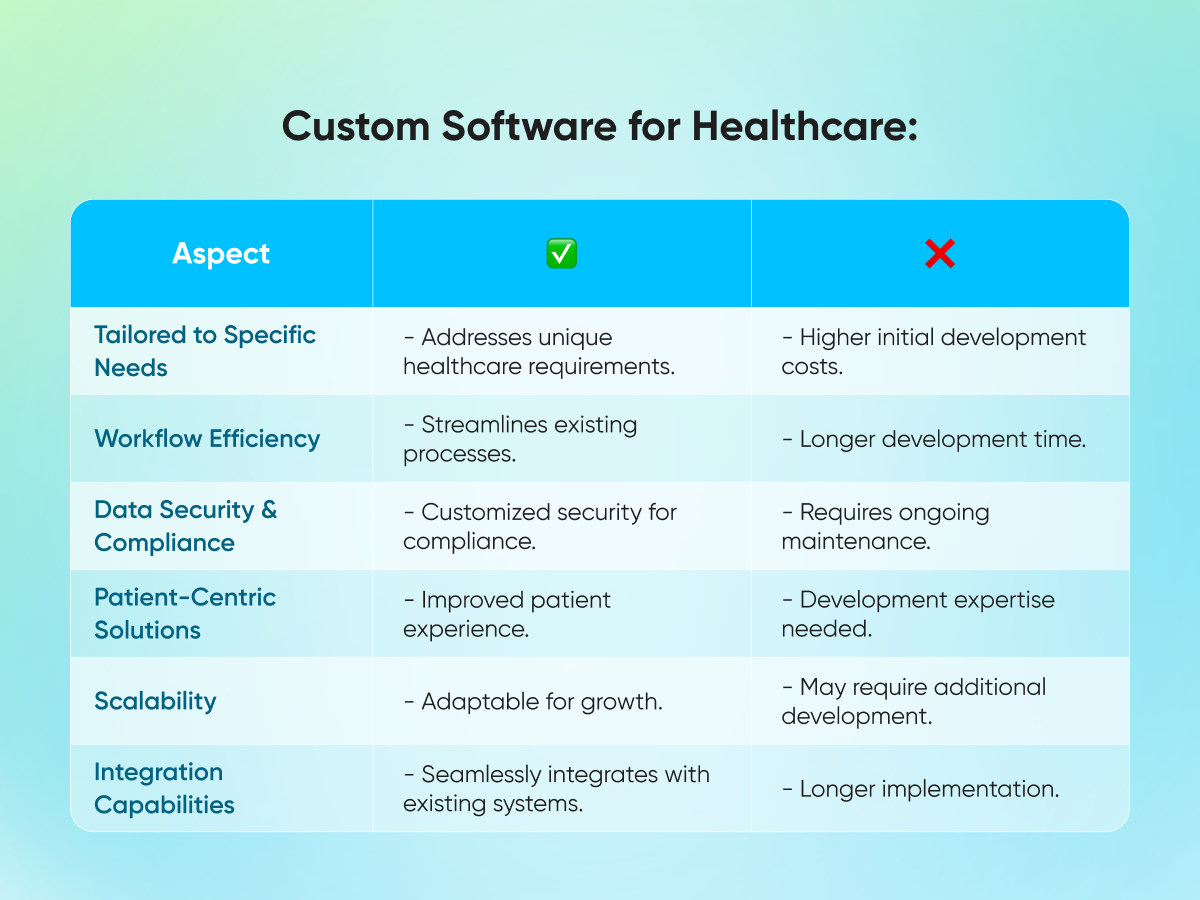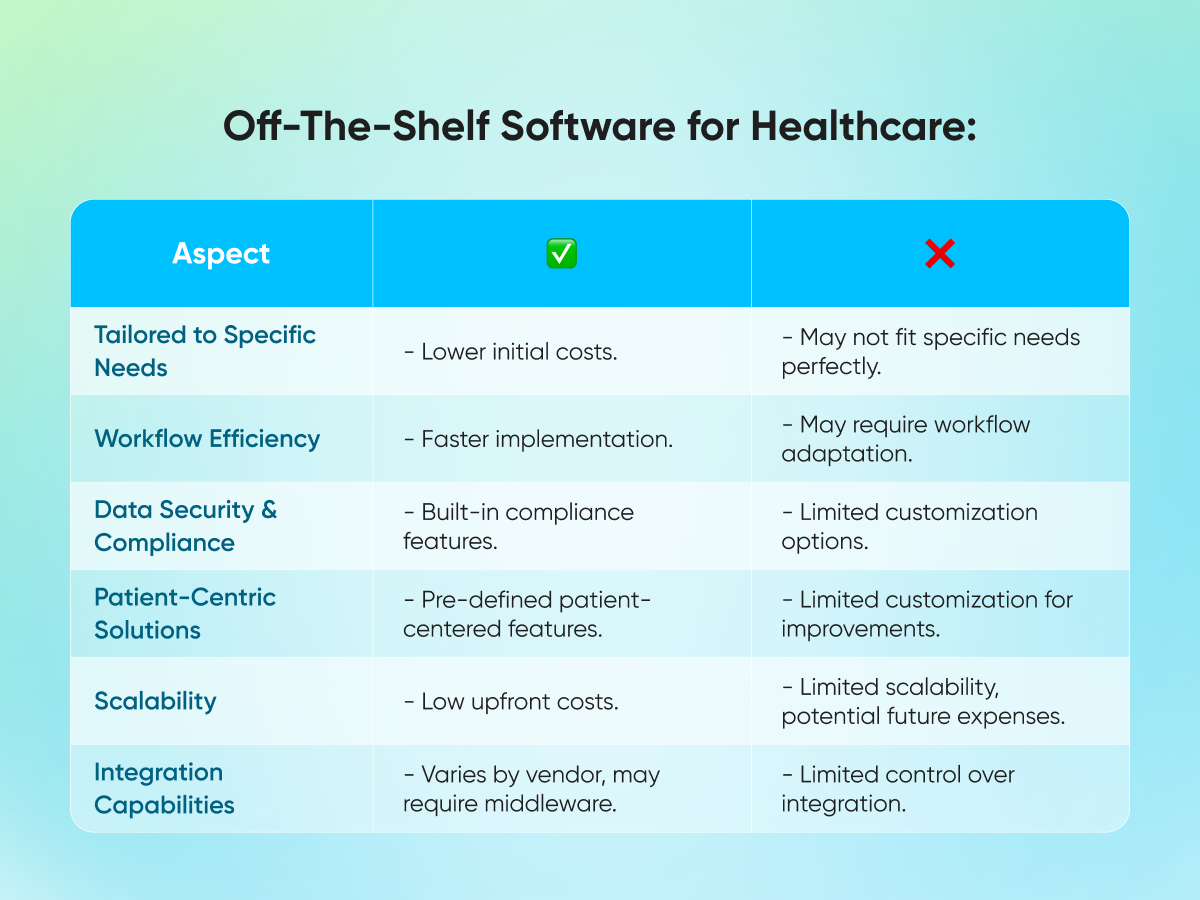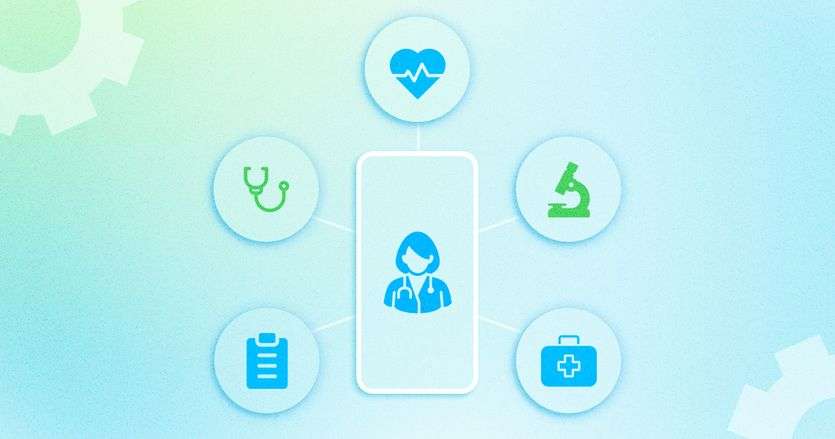The Health Care market is on a robust growth trajectory, with projected revenues of US$57.86 billion in 2023, and an anticipated annual growth rate (CAGR 2023-2027) of 10.40%. By 2027, the market volume is forecasted to expand to US$85.95 billion, reflecting the sector's increasing importance. Furthermore, the user base in the Health Care market is set to surge, reaching 1.6 billion users by 2027, with user penetration expected to rise from 15.0% in 2023 to 19.8% by 2027. This growth is expected to result in an average revenue per user (ARPU) of US$50.20, underscoring the industry's economic significance. (Statista)
From electronic health records (EHRs) to telemedicine platforms, healthcare applications have become an integral part of patient care and hospital management. As healthcare providers strive to improve patient outcomes and operational efficiency, the question arises: is it worth investing in customized software for healthcare application development?
What Is Custom Software Development?
Custom software development involves the creation of tailored applications designed to meet the unique requirements of a business. Whether through an in-house team or outsourcing partners, the process begins with a comprehensive understanding of your specific needs, followed by the development of a program tailored to address those needs.
While the initial cost of building custom software may be higher compared to purchasing pre-made applications, the long-term benefits often outweigh the expense. Custom software not only offers a competitive advantage but also saves time in the long run. Additionally, the flexibility of custom software allows for seamless adjustments and the incorporation of new features as business requirements evolve in the future.
The Need for Custom Software
Healthcare is a diverse field with specific needs and regulations, which can vary from one facility to another. Customized software, tailored to the specific needs of a healthcare organization, can offer several advantages.
1. Improved Workflow Efficiency
Custom healthcare applications can be designed to streamline workflows within a particular healthcare setting. Whether it's appointment scheduling, patient record management, or billing, custom software can be fine-tuned to fit seamlessly into existing processes, reducing errors and saving time.
2. Enhanced Data Security
Patient data security is a paramount concern in the healthcare industry. Custom software allows organizations to implement robust security measures that meet their specific compliance requirements, such as HIPAA in the United States. These tailored security protocols can provide better protection against data breaches and cyber threats.
3. Patient-Centric Solutions
Healthcare applications should ultimately serve the needs of patients. Custom software can be designed with a focus on patient experience, making it easier for patients to access their health records, schedule appointments, and interact with their healthcare providers.
4. Scalability
As healthcare organizations grow, their software requirements may change. Customized software can be built with scalability in mind, allowing for future expansion and adaptation as the organization's needs evolve.
5. Integration Capabilities
In a healthcare ecosystem, different systems need to work together seamlessly. Custom software can be designed to integrate with existing software and hardware systems, facilitating the exchange of data and ensuring a more cohesive healthcare infrastructure.
On the surface, everything may appear satisfactory, but the availability of off-the-shelf software remains a viable option. While it's a common practice, we advise you to make an informed decision by considering the following comparative analysis.


What to Consider When You Choose Custom Software for Healthcare
When selecting custom software for healthcare, there are several crucial factors to consider to ensure that the solution aligns with your organization's specific needs and objectives. Here's what to keep in mind:
- Patient-Centric Approach: Focus on patient experience and engagement. The software should make it easy for patients to access their records, schedule appointments, and interact with healthcare providers. User-friendliness is crucial.
- Integration Capabilities: Ensure that the custom software can seamlessly integrate with existing healthcare systems and hardware. Compatibility is crucial to maintaining a cohesive IT ecosystem.
- Data Migration and Legacy Systems: If transitioning from older systems, consider how data migration will be managed and how the new software will work with legacy systems during the transition phase.
- Budget and Cost Analysis: Carefully evaluate your budget for custom software development, including initial costs and ongoing maintenance. Be prepared for potential higher upfront expenses in exchange for long-term cost savings.
- Development Expertise: Ensure access to skilled software developers with a deep understanding of healthcare industry needs and regulations. The development team's expertise is critical to the success of the project.
- User Training and Support: Plan for adequate training and support for staff who will be using the custom software. A well-trained team is essential for effective utilization.
- Testing and Quality Assurance: Rigorously test the custom software to identify and rectify any bugs or issues. Quality assurance is vital to ensure the software functions smoothly and reliably.
- Vendor Reputation: If you opt for an external development partner, carefully assess their reputation, experience, and track record in healthcare software development.
- Return on Investment (ROI): Evaluate the potential ROI the custom software can bring in terms of improved efficiency, patient care, and competitive advantage. Consider how long it will take to recoup the initial investment.
Custom software for healthcare is a significant undertaking, but by carefully considering these factors, you can make an informed decision and ensure that the software solution aligns with the unique needs and goals of your healthcare organization.
How Much Does It Cost To Develop Custom Healthcare Software?
While the typical cost range often mentioned falls between $50,000 and $250,000, it remains a broad spectrum. For a precise assessment of the expenses associated with your custom healthcare software, it is advisable to request a detailed estimate from a software development company with a proven track record in creating healthcare and medical software.
Why choose Movadex for Healthcare Custom Development?
Movadex has successfully collaborated on over 10 diverse healthcare projects, ranging from beauty to sustainability. Our primary objective is to deliver top-notch healthcare software tailored to your needs, offering comprehensive services from design to deployment and beyond, including scalability. If you're seeking custom software solutions, explore our approach and discover how we can assist you.




